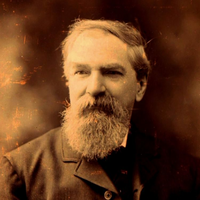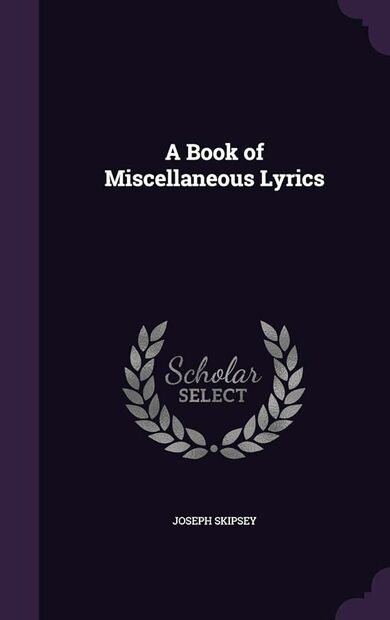WOULD I could waken numbers, brighter, sweeter,
Than is the lark’s song in the cloud above,
Then would I tell you in befitting metre,
How much the Seer is worthy of your love.
Shy, sensitive is he, and far from equal
Unto the battle of material life,
He strives unheeded and, too oft the sequel,
Unheeded falleth in the bitter strife.
Averse to falsehood and pretences hollow,
Averse to slander, cruelty, and wrong,
He scorns the gilded car of pomp to follow,
And underneath is trampled by the throng.
Too nobly strung of self to brook the mention—
Too sweetly strung to give another pain—
Too finely strung to pleasure in contention,
He seeks within the meed he would obtain.
Unlike the crowd who never dare look inward,
Lest they a hideous spectre there should meet,
Would point to secret longings prompting sinward,
He looks within and finds a solace sweet.
Ay, in a conscience pure he sees a charmer—
A harper from whose harp such tones are hurl’d,
They act as mighty spells, as tested armour,
To shield him from the malice of the world.
‘Go on, brave heart,’ he hears an anthem chanted,
The distant echoes of that harp’s weird tones;
‘Go on—to thee a richer dower is granted
Than that which gilds a hundred monarchs’ thrones.
‘Thou may’st be thrust aside and scorned and taunted
As being a lunatic, a knave or fool,
Thou hast within thy inner being planted
A power that yet shall put the world to school.
‘Thou rnay’st be destined here to tribulation;
Thy every pang shall prove a key, by which,
Thou shalt unlock some safe of the Creation,
And with its precious stores thy mind enrich.
‘Illumined by that sun forever burning,
Deep in the centre of the inner spheres,
Thou shalt be gifted with the gift of learning
What lieth hidden from thy mortal peers.
’In every planet in the midnight heaven—
In every hue doth in the rainbow blend,
Shalt thou perceive a lore and meaning, given
To very few on earth to comprehend.
‘The very flower upon the meadow blowing—
The very weed down trampled on the road,
Shall be to thee a priceless casquet, glowing
With glories hinting of the light of God.
’In every breezelet—nay, in the commotion
Of raging winds—in every streamlet clear—
Nay, in the roaring of the mighty ocean,
Shalt thou hear sounds will gladden thee to hear.
‘Thus shalt thou in the Universe external,
The Universe internal read, and so
Possess what shall be to the weal eternal
Of earth’s benighted ‘habitants to know.
’The buried eons of the Past—their history,
Still glows in characters that thou shalt read;
And from the future thou shalt pluck its mystery,
And point the goal to where the moments lead.
‘Whatever thrills the heart with feelings precious,
Whatever tends to cast the spirit down,
The deed delightful, or the hint pernicious,
Shall claim withal in turn thy smile or frown.
’Remind shalt thou the soul aweary, weary
Even with the battle thou thyself hast fought,
How thro’ deep failure and thro’ toil uncheery,
Must every triumph worth his care be wrought,
‘Nay even at the hest of a volition
Still, still to highest purposes attuned,
Shalt thou go forth a monarch, and ambition
And evils many with thy glance confound.
’Woe,' black-browed guilt shall cry; and 'woe’ and
vanish
Despair and desolation, sisters sad;
And for the hydra-brood thou thus shalt banish,
Celestial Love shall make the spirit glad.
‘Uplifting them by slow yet sure gradations,
From spheres inferne into the spheres superne,
Shalt thou thus prove a boon unto the nations,
And in return a boon divine shalt earn.
’If not in monuments of brass or marble,
Deep in men’s spirits shall thy glory glow;
And little ones shall of the wonders warble
Accomplished by the wise man long ago.
‘All this and more than this shall be thy guerdon,—
The sense of having acted right!’—So says
The happy echo of that harp’s sweet burden
A certain Seraph in his bosom plays.
And this enableth the true seer ever
To triumph tho’ he falleth, and to pray
That theirs like his may be a portion, never,
Who plot and plan to take his life away.
Ah, to the last his words and deeds are sweeter
Than is the lark’s song in the cloud above,
And rare the bard could find befitting metre,
To hymn the love we owe this child of Love!


